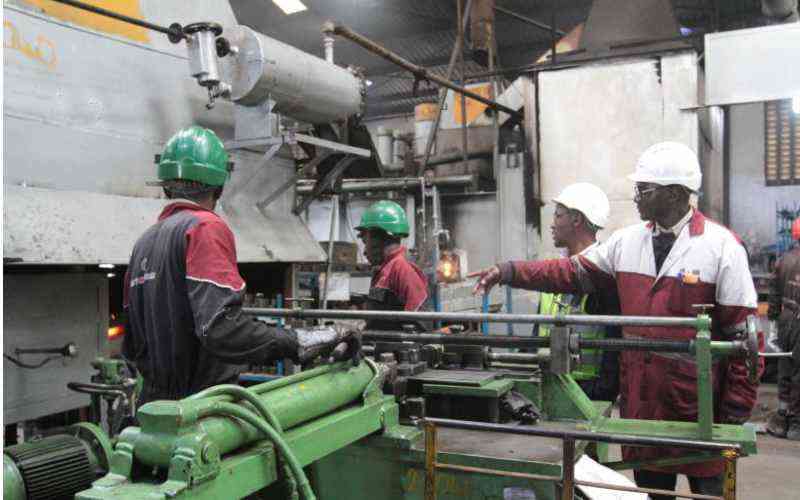Lack of policies crippling Kenya's leather industry, stakeholders warn
Nairobi
By
Collins Kweyu
| Mar 24, 2025

Livestock PS Jonathan Mueke (lef) is shown some of the products made at Reddamac Leather Centre by Managing Director Robert Njoka during his tour of the factory in Nairobi. [Collins Kweyu, Standard]
Lack of supportive policies and implementation is affecting the leather industry, stakeholders in the sector have said.
The Chairman of the Kenya Tanners Association said that although the Kenya Leather Development Council had developed a policy in collaboration with the Ministry of Livestock, its implementation has stalled.
"Some beneficial policies have been reversed before the industry could fully benefit including the reduction of import duty on footwear as per the government directive of August 9, 2021, that was issued by the National Treasury to the KRA Commissioner General," Njoka said.
He said this when the Principal Secretary of Agriculture and Livestock Jonathan Mueke toured his Reddamac Leather Centre along Eastern bypass, Nairobi on Friday.
READ MORE
Business confidence hits decade low despite private sector growth
Business confidence falls to 10-year low despite private sector growth
Tribunal upholds Chinese firm's Sh340m tax bill
Hong Ting forum held in Kenya to advance China-Africa modernisation drive
Kakuzi targets US market for avocado exports
NSE: Is it becoming a formal 'casino' with the speculative trading?
Trump tariffs threaten Kenya's Sh72b exports
Keeping E coli disease at by in laying flocks
Jubilee posts record Sh6b profit as gross premiums jump 34pc
Njoka said the imposition of duty on imported leather finishing chemicals, causing delays at ports, increased storage costs and operational disruptions were making local leather more expensive and non-competitive.
"Without urgent action, the industry risks losing the progress made over the past decade," he said.
He said the government must intervene at the highest level to prevent further decline and ensure Kenya's leather sector remains competitive and sustainable.
Njoka disclosed that eight tanneries have been closed in the past three years among them Leather Industries of Kenya in Thika, Athi River Tanneries (Mavoko), Dog bones (Nairobi ) and New Market Leather, Nairobi.
Others he said are Nairobi Tanneries, Amin Tanneries (Nairobi), Samitex Tanners (Nairobi) Msai Tanneries (Nairobi ) and Nakuru Tanners ( Nakuru).
"The closure of these tanneries and reduced operational capacity of the existing ones have resulted in the loss of over 2,000 direct jobs and 5,000 indirect jobs," said Njoka.
He added that the smuggling of hides and skins is also a key challenge affecting the leather industry.
"The industry has struggled with a shortage of high-quality raw rides and skins, worsened by illegal exports and West Africa for food processing," Njoka said.

